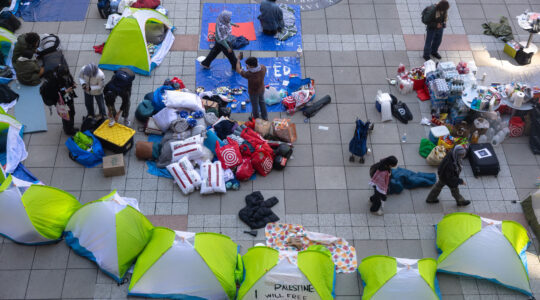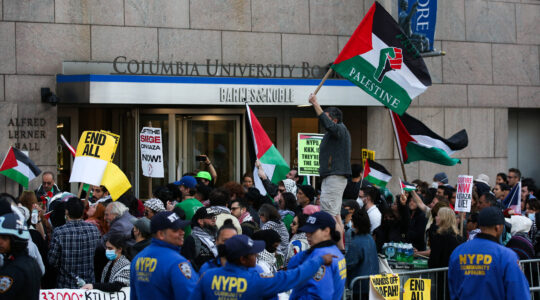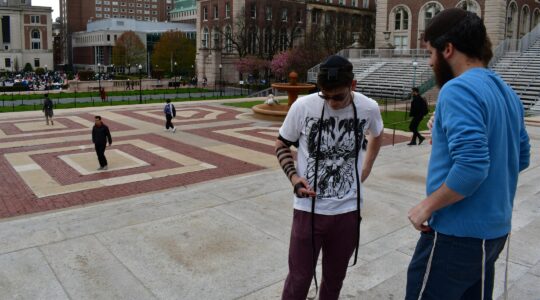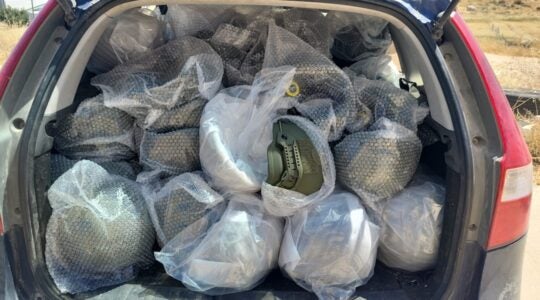
Maddie Garfinkle, 4, plays the drum at a Yad B’Yad session at the Rose Schnitzer Manor at Cedar Sinai Park in Portland, Ore., as her mom, Ali, looks on and her brother, Ian, 2, shares an instrument with his great-grandmother, Annette Gerard. Other Rose Schnitzer Manor residents look on. (Peter Korchnak, Cedar Sinai Park)
WASHINGTON (JTA) – Nearly two dozen senior citizens in their 70s, 80s and 90s sit in a circle. Seated on mats within that ring are babies and toddlers with their parents or caregivers.
Kim Palumbis joins in, strumming her guitar, singing and calling out instructions. Participants — young and old — clap their hands, stamp their feet, roll balls back and forth, and give one another high-fives and hugs. At the end of the 45-minute music program, they begin to celebrate Kabbalat Shabbat.
Palumbis, co-creator of the Oybaby videos, which focus on Jewish music and holidays, is leading the Yad b’Yad International Program at the Rose Schnitzer Manor in Portland, Ore. The progam — held on the Cedar Sinai Park campus, which includes independent- and assisted-living facilities as well as a nursing home — is one of a growing number of Jewish programs nationwide that bring together youngsters and older adults. The programs can engender powerful emotional experiences on both ends of the age spectrum.
As with Yad b’Yad and many intergenerational programs, the goals is not just to providing the elderly with companionship and distractions from the aches and pains associated with aging, but to help the different generations be comfortable with each other. In some cases it leads to continued relationships.
Mark Zeitzer used to go with his three sons, ages 5, 3 and 1, to visit his wife’s grandmother at Schnitzer Manor. Even after the grandmother died earlier this year, Zeitzer continued to bring his 3-year-old, Ari.
The facility has become a “second home for us,” Zeitzer said. They look forward to visits as much as to trips to Chuck E. Cheese, he said.
“Seeing the smiling faces of the kids automatically makes the residents smile,” Zeitzer went on. Some residents “give Ari rides on their wheelchairs or their motorized scooters,” he said. “Ari could be pretty shy, so it’s really remarkable to see him come out of his shell like that.”
Residents say they enjoy the youngsters’ visits, too. Seeing children at the facility “makes me feel very good,” said resident Anne Gerard, 87. “I know a lot of the residents look forward to” the Yad b’Yad visits.
“It’s wonderful what happens in terms of the merging of generations, of cultures,” said Tamar Landes, the associate executive director for community and volunteer relations at Dorot, a New York-based group that runs senior programs mostly for older adults living in their own homes.
Some Dorot programs are run out of senior day centers, matching students with senior adults for activities such as current events discussions. She said a conversation between the generations that took place after New York City Mayor Michael Bloomberg announced his plan to restrict the size of soda portions in the city was particularly animated.
“A lot of volunteers said they haven’t paid attention to older people,” Landes said. Now they’ll notice seniors, she said, particularly if they see an older person who needs help.
At Drexel University in Philadelphia, the Judaic studies program brought together elementary school students from the Perelman Jewish Day School Stern Center in Wynnewood, Pa., and members of the JCC’s Stiffel Senior Center in Philadelphia. The senior center closed last year, but the program continues with former Stiffel members who now meet at the Jewish Federation of Greater Philadelphia headquarters.
The activities include having the seniors bring and talk about “historical objects from their family, a piece of jewelry, a photograph, an artifact — maybe a baking pan that came from Persia or Eastern Europe,” said Rakhmiel Peltz, who heads the Judaic studies program. The young students create a timeline around the object, explaining its origins, how it was used and when it came to America. His college students, meanwhile, primarily observe and write about the interactions as part of their coursework. They also interact with the kids and the seniors, of cou
“Everyone has something to learn and something to contribute,” Peltz said.
The young people and seniors sometimes find things in common. At the Ring House, an independent living facility in Rockville, Md., for older adults, 13-year-old Danielle (whose father would not give permission for her last name to be used) bonded with Florence Grossberg, 89, over knitting.
Danielle, of Brookeville, Md., started volunteering at Ring House for mandatory community service school credits, but is continuing to visit Grossberg, who’s been helping her with needlework and teaching her new stitches.
“I like to knit and she teaches me new things,” Danielle said, noting that she in turn has shown Grossberg how to play games on an iPad. “She’s fun to hang out with.”
Grossberg calls Danielle “a lovely young girl.”
Another bond formed between Fred Richton, 93, and Anna Gorfinkel, 12. While interviewing each other during the summer program that the Jewish Community Center of Longmeadow, Mass., held with Jewish Geriatric Services, also in Longmeadow, they discovered a shared fondness for math. JGS runs Ruth’s House, the assisted living residence where Richton lives.
“It’s very interesting, and you get to interact with the residents and they show you around,” Anna said, noting that Richton, who is legally blind, explained how he is able to see shapes out of the corner of his eye.
For his part, Richton said, “I like the idea of exchanging ideas and finding out what the kids are looking for, what their objectives in life are.”
Richton also has been a regular participant in an intergenerational program, Ties That Bind, that JGS runs with Temple Beth El in Springfield, Mass. The program, geared toward Beth El’s b’nai mitzvah students, focuses on Jewish teachings regarding aging and spiritual values such as honor and reverence for the elderly, compassion and loving kindness, “especially to the vulnerable and the frail in our midst,” said Rabbi Devorah Jacobson, the director of pastoral care at JGS. The program also includes lessons on the aging process, and has the youngsters and elderly do projects together similar to the interviews that Anna and Richton conducted with one another.
“For a year or so I stay in contact with most of the kids,” Richton said. “It gives them a better idea of other people and people as they age, and the experience of the older person.”
It also helps the older residents. “You’re getting a fresh outlook of youth, full of vigor and full of life,” Richton said. “It buoys you up.”





